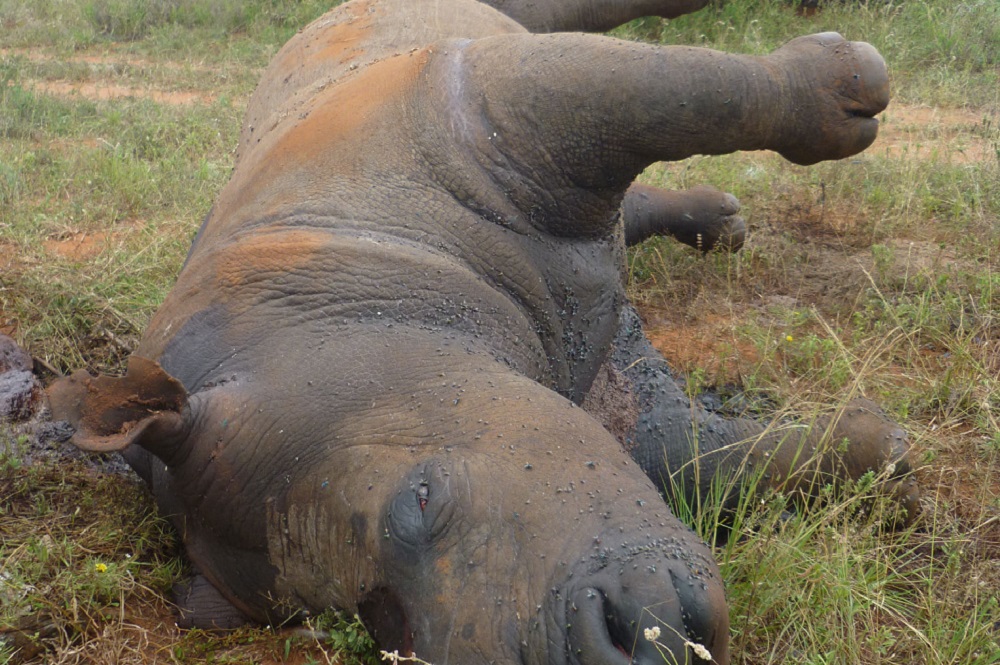Photo credit Lowveld Rhino Trust
South Africa is currently experiencing a catastrophic rhino poaching crisis, with 668 rhinos lost during 2012. It is now evident that Mozambique has played a key role in this illegal killing.
The vast majority of rhinos killed in South Africa are poached in Kruger National Park, which shares a long, porous border (356km) with Mozambique, where most of the poachers come from. Poachers from Mozambique are easily able to illegally slip across the border into Kruger National Park, and even if South African National Parks rangers are able to detect them, they are unable to carry out the ‘hot pursuit’ once the poachers have crossed the border back in Mozambique. During March 2013 alone, Kruger Park recoded 72 known cross-border armed incursions from Mozambique. Of the 94 rhino related arrests in South Africa this year, 44 of these have been in Kruger (9 May 2013).
In Mozambique, there are no strict penalties for rhino poaching or possession of rhino horn and poaching is simply considered a misdemeanour offence. Mozambique is one of the poorest countries in the world, and there are many individuals willing to risk their lives to earn money through poaching. The country suffers from high corruption and even Mozambican field rangers have been arrested for rhino poaching.
Recent reports claim that settlements have sprung up along the Mozambican border, with towns thriving on the money received from the illegal sale of rhino horn to criminal gangs. International criminal syndicates have been quick to recruit willing poachers, where lack of law enforcement means gangs are easily able to export the rhino horn Eastern Asian markets.
There was once a fence separating the Kruger National Park from Mozambique. However in December 2002, the presidents of South Africa, Mozambique and Zimbabwe signed an international treaty to establish the Great Limpopo Transfrontier Park. The treaty resulted several areas of fence being dropped along the South Africa / Mozambique border to increase the habitat for wildlife and encourage animals to roam between the countries’ nature reserves.
There are now fresh calls for the fence to resurrected in a bid to reduce the current poaching onslaught. South Africa, at a ministerial level, is currently involved in ongoing discussions with Mozambique regarding the re-erection of the fence along the border. In the longer term, the huge problems South Africa is experiencing has implications for the wider issue of trans-frontier parks; what happens to wildlife when one country does not enforce security or wildlife crime laws?
In May 2013, there were several news reports that Mozambique had lost all its rhinos from Limpopo National Park. In reality there were few rhino remaining in the country, at the 2011 AfRSG meeting, estimates were that there were 6 white rhinos and 1 black rhino surviving in Mozambique. It is more likely that the rhinos poached were the unfortunate ones who walked across the border from Kruger National Park in South Africa; so the recent reports seem to be referring to South African rhinos that have been poached on Mozambican soil.
Following on from the 16th Conference of Parties to the Convention on International Trade in Endangered Species of Wild Fauna and Flora (CITES), urgent actions have been directed to Mozambique to tackle its role in the rhino poaching crisis. These include the need to give priority attention to the creation and implementation of effective legislation to effectively deter wildlife crime, prevent the illegal killings of rhinos and possession of rhino horn. Along with Vietnam, Mozambique has been given a deadline of January 31 to implement these actions and submit a report to CITES on its activities conducted.
There are several key aspects that Mozambique urgently needs to address including the need to step up anti-poaching patrols along the Kruger and allow South African rangers to pursue poachers once they have crossed the Mozambique border. Mozambique urgently needs to improve its wildlife legislation and make rhino poaching a punishable crime. It also needs to address the illegal trafficking of rhino horn through its main ports, to prevent the country from being a major hub for the export of wildlife products from Africa to Asia. Direct engagement and co-operation with South Africa is essential for Mozambique to tackle this escalating crisis.
Photo credit (top) Sarah Nelson









